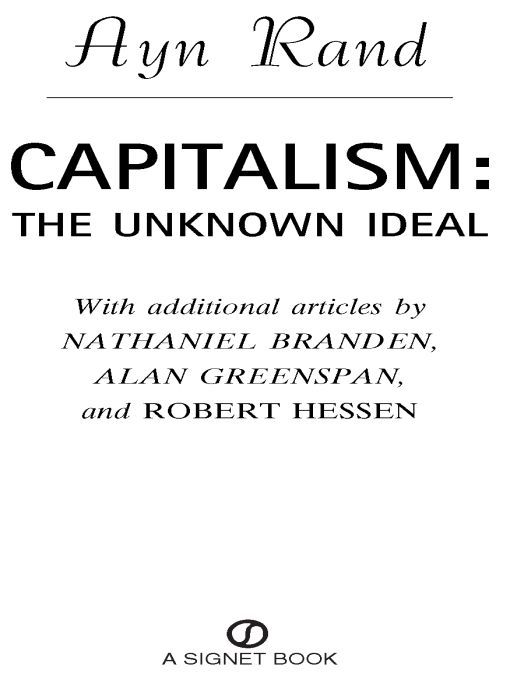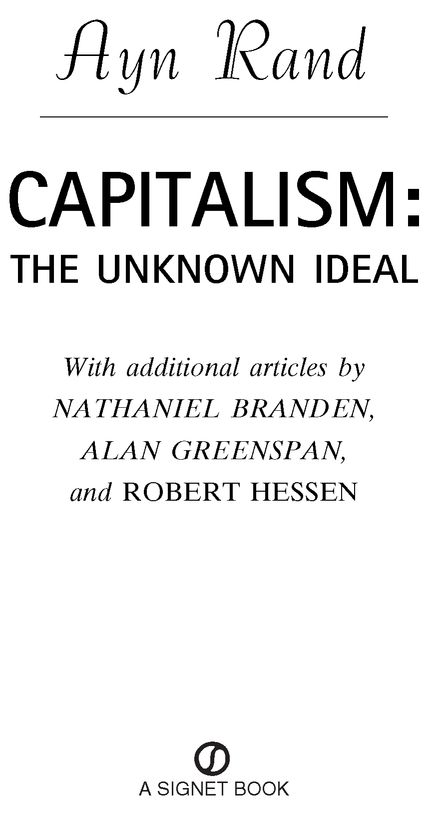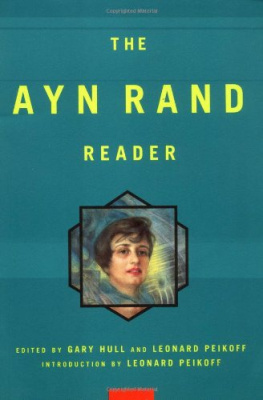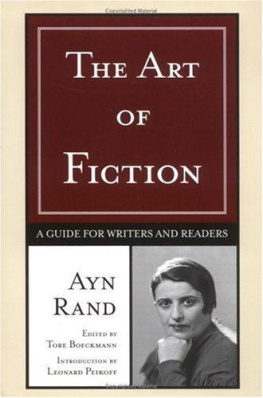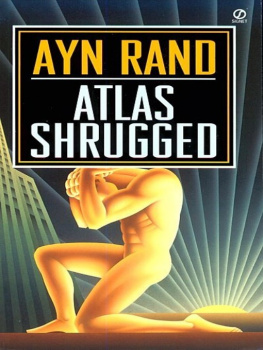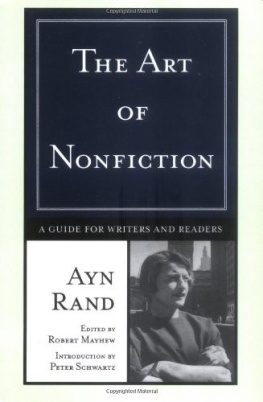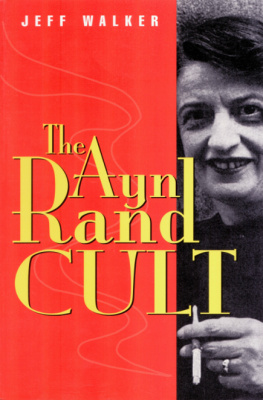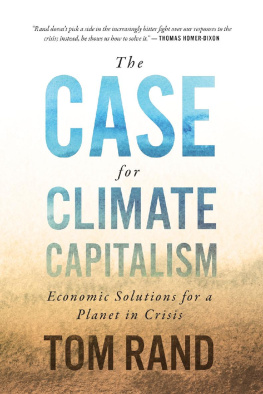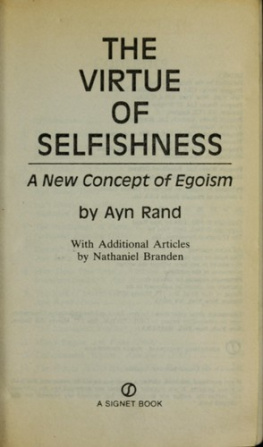Table of Contents
CAPITALISM
is the only system geared to the life of a rational being and the only moral politico-economic system in history.
AYN RAND
and the Objectivists launch a major offensive in the name of a new morality. In one fiery article after another they show that capitalism is still an unknown ideal, threatened with destruction without a hearing, without any public knowledge of its principles, its nature, its history, or its moral meaning.
The political philosophy of Miss Rands bestselling novels is presented here in a challenging new appraisal of our era, by the radicals for capitalism.
INTRODUCTION
This book is not a treatise on economics. It is a collection of essays on the moral aspects of capitalism.
Our approach can best be summarized by my statement in the first issue of The Objectivist Newsletter (January 1962):
Objectivism is a philosophical movement; since politics is a branch of philosophy, Objectivism advocates certain political principlesspecifically, those of laissez-faire capitalismas the consequence and the ultimate practical application of its fundamental philosophical principles. It does not regard politics as a separate or primary goal, that is: as a goal that can be achieved without a wider ideological context.
Politics is based on three other philosophical disciplines: metaphysics, epistemology and ethicson a theory of mans nature and of mans relationship to existence. It is only on such a base that one can formulate a consistent political theory and achieve it in practice.... Objectivists are not conservatives. We are radicals for capitalism; we are fighting for that philosophical base which capitalism did not have and without which it was doomed to perish.
I want to stress that our primary interest is not politics or economics as such, but mans nature and mans relationship to existenceand that we advocate capitalism because it is the only system geared to the life of a rational being.
In this respect, there is a fundamental difference between our approach and that of capitalisms classical defenders and modern apologists. With very few exceptions, they are responsibleby defaultfor capitalisms destruction. The default consisted of their inability or unwillingness to fight the battle where it had to be fought: on moral-philosophical grounds.
No politico-economic system in history has ever proved its value so eloquently or has benefited mankind so greatly as capitalismand none has ever been attacked so savagely, viciously, and blindly. The flood of misinformation, misrepresentation, distortion, and outright falsehood about capitalism is such that the young people of today have no idea (and virtually no way of discovering any idea) of its actual nature. While archeologists are rummaging through the ruins of millennia for scraps of pottery and bits of bones, from which to reconstruct some information about prehistorical existencethe events of less than a century ago are hidden under a mound more impenetrable than the geological debris of winds, floods, and earthquakes: a mound of silence.
To obliterate the truth on such a large scale, to hide an open secret from the world, to hidewithout any power of censorship, yet without any significant sound of protestthe fact that an ideal social system had once been almost within mens reach, cannot be done by any conspiracy of evildoers; it cannot be done except with the tacit compliance of those who know better.
By their silenceby their evasion of the clash between capitalism and altruismit is capitalisms alleged champions who are responsible for the fact that capitalism is being destroyed without a hearing, without a trial, without any public knowledge of its principles, its nature, its history, or its moral meaning. It is being destroyed in the manner of a nightmare lynchingas if a blind, despair-crazed mob were burning a straw man, not knowing that the grotesquely deformed bundle of straw is hiding the living body of the ideal.
The method of capitalisms destruction rests on never letting the world discover what it is that is being destroyedon never allowing it to be identified within the hearing of the young.
The purpose of this book is to identify it.
The guilt for the present state of the world rests on the shoulders of those who are over forty years old today (with a very few exceptions)those who, when they spoke, said less than they knew and said it less clearly than the subject demanded.
This book is addressed to the youngin years or in spiritwho are not afraid to know and are not ready to give up.
What they have to discover, what all the efforts of capitalisms enemies are frantically aimed at hiding, is the fact that capitalism is not merely the practical, but the only moral system in history. (See Atlas Shrugged.)
The political aspects of Atlas Shrugged are not its theme. Its theme is primarily ethical-epistemological: the role of the mind in mans existenceand politics, necessarily, is one of the themes consequences. But the epistemological chaos of our age, fostered by modern philosophy, is such that many young readers find it difficult to translate abstractions into political principles and apply them to the evaluation of todays events. This present book may help them. It is a nonfiction footnote to Atlas Shrugged.
Since every political system rests on some theory of ethics, I suggest to those readers who are actually interested in understanding the nature of capitalism, that they read first The Virtue of Selfishness, a collection of essays on the Objectivist ethics, which is a necessary foundation for this present book. Since no political discussion can be meaningful or intelligible without a clear understanding of two crucial concepts: rights and governmentyet these are the two most strenuously evaded in todays technique of obfuscationI suggest that you begin this book by reading (or rereading) two essays from that earlier collection, which you will find here reprinted in the appendix: Mans Rights and The Nature of Government.
Most of the essays in this book appeared originally in The Objectivist Newsletter (now, in magazine format, The Objectivist); others are based on lectures or papers, as indicated. Some of the essays cover, in brief summary, the answers to the most widely spread fallacies about the economics of capitalism. These essays appeared in the Intellectual Ammunition Department of The Objectivist Newsletter and were written in answer to questions from our readers. Those who are interested in studying political economy will find, in the appendix, a recommended bibliography on that subject.
Now a word about the contributors to this book. Robert Hessen is presently completing his doctorate in history at Columbia University, and is teaching in Columbias Graduate School of Business. Alan Greenspan is president of Townsend-Greenspan & Co., Inc., economic consultants.
AYN RAND
New York, July 1966
P.S. Nathaniel Branden is no longer associated with me, with my philosophy or with The Objectivist.
A.R.
New York, November 1970
Theory and History
1. WHAT IS CAPITALISM?
by Ayn Rand

